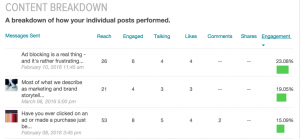The last couple of years really taught us a bundle about business. One of the things is that everybody is getting pretty comfortable with right now is Zoom and doing remote meetings. That has also led to a bunch of people being much more comfortable working from home. Maybe they like going out to the coffee shop to get away from their home to work. We’ve had to adapt, not only technologically, but organizationally. And we need to find and keep better people.
This is something I’d like to call the post-pandemic pivot.
Last year, I started off talking about pivoting and people hated that term. But it is something that we’re going to have to address, especially those of us who have employees. Now, maybe you’ve lost some employees, maybe you’re looking for some new ones, but at a live meeting last week, almost every person in the room said their biggest challenge right now is finding and keeping talent.
If you need to find better people, maybe you should start marketing your business culture to everyone. Let me explain.
The Talent Pool
There are many reasons why we’re having problems finding qualified workers. First and foremost, some people have discovered, “Hey, it’s costing me too much money between childcare and everything I have to do with commuting and clothes and all that stuff. It’s better if I just stay home.” Well, that’s good for them, but that takes people out of the workforce.
Also, over the last year or so, some companies have been so focused on their top performers that they’ve neglected the support staff and other people who help them. Try to imagine everybody in your company as a human capital asset. Invest in them and they will pay back dividends.
Another factor is that some companies have learned that you don’t need everybody in the office at the same time. Some companies have determined they’re better off with a remote workforce, which means that people can meet via Zoom. As a matter of fact, some companies are looking at hybrid models where people come in two to three days a week and spend the rest of the time working from home. There are improved efficiencies of not having to commute and not having to focus on eight contiguous hours or more per day. Split it up, do two in the morning, two midday, and maybe three or four at night. It depends on your workers and what things you need to do as a team, but there are flexibilities that you can build into your business.
Lifestyle Values
Millennials want flexibility. They’re not as interested in money as they are in a lifestyle. They want to be able to afford what they want to do in their off time and with their friends and family. Another piece of this is what we call the gig economy, or the creator economy. Some people hate the word gig economy because it sounds like you go in and do one gig and then leave. No, it’s about tasks. It’s about finding people to do specific tasks that they are very proficient in and bringing them in as needed.
That’s one of the ways I’ve been able to grow my business. I find people who are really good at one thing and then assemble my team. They almost do it like an assembly line, where somebody writes an eBook, and somebody designs it, and then somebody turns it into blogs, and then somebody posts those up on the website, then somebody creates a download form for the eBooks, and then we create email and graphics from that and drip email marketing. All of that is a system, but it requires a bunch of different people with different strengths to perform each task. We can sequence those and keep everybody happy and busy, but they only have to focus on what they know. That makes them more efficient and creates a better working environment for everyone.
Marketing Your Culture
If you want to promote your business to try to attract those people, you have to share what your business is about and your culture as part of your marketing platform. Let me toss out three basic ideas that I think can help you.
Share Your Culture
Let the world know, through social media or videos, what your company cares about. How are you being socially conscious, and how is your company giving back to the greater good or the community or the world?
The next thing you can do is show the world how you care about individuals and help people realize their opportunities and self-worth through work. Show them that you are very pro self-improvement, that if they work for you, they will come out of that opportunity stronger, smarter, and better.
The other thing you could talk about with culture is workplace innovations. How do you make the work fun? How do you make it flexible so people can adapt to their lifestyles? What makes you different than any other company out there? Sure, you could put in a game room and put in massage chairs, but what is it about your business that is vastly different from anyone else?
Celebrate Your Employees

Show people that they can achieve things both inside and outside of work by working for your company. You can do this by helping people share their own personal achievements. Maybe they ran a marathon or a 5k and won, or maybe their kids won their softball or soccer league. Let others know that you support them both inside and outside of work. Make sure you’re telling stories. Make people imagine that their life could be better by working for you and your company. Help people envision their own dreams through your business and you’ll be able to easily find and keep better people.
Embrace Innovation
The last piece of this is to share innovation. Maybe you’re one of those companies that allow people to pick and choose what they want, a la carte. Some people want to get promoted and make more money while other people are more motivated by accumulating more time off. Allow your team to pick and choose the way that they do this. Let people know, “Hey if you want to work for us, you can take a one-month sabbatical any time of the year, with advanced notice, and go explore and learn what you want.”
Show that people can earn and learn through you in various ways. Show your flexibility. Talk about somebody working from home or somebody working at a coffee shop that solved a huge problem for your company, your customers, or your other employees. Celebrate that they can do things in various places, that they don’t have to be tethered to a desk.
Finally, you want to take the pulse of other people working in the marketplace and then share those insights in your marketing. Use polls, surveys, and simple questions on social media, to get people to give feedback about what’s important to them, and compile the results. Then, share those. For example, ask people about what they consider work-life balance to be. Is it eight-hour days or small hourly sessions? Choose questions that get great responses.
Final Thoughts
If you want to win at the talent game, you have to market to them as hard as you do your customers.
I would love to hear your thoughts on this. Comment below and share your thoughts, ideas, or questions about what great advice you would share about marketing your culture to find and keep better people. How did your business cope with the Post-Pandemic Pivot? Have you lost or gained great new employees? What worked and what did not live up to your expectations? Do you have any ideas or other advice you could share?
Business & Finance Articles on Business 2 Community
(55)
Report Post




